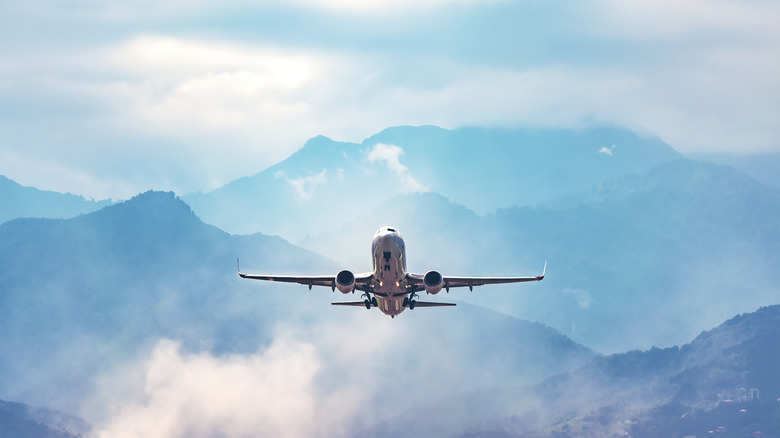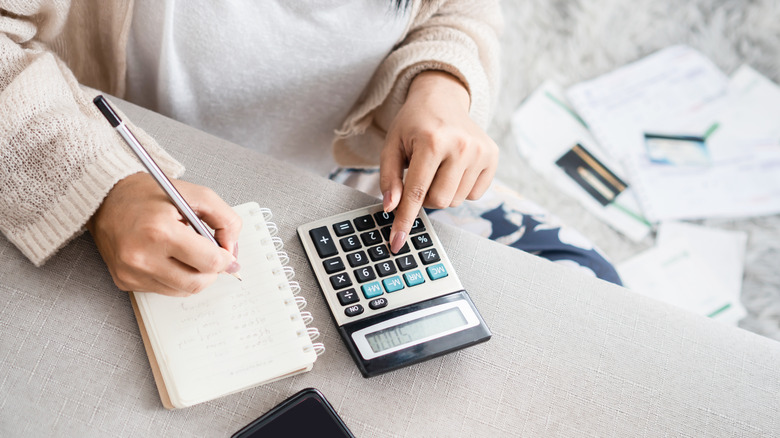Why You May Start Seeing 'Green' Airfares On Your Favorite International Airlines
It's no secret that air travel is a major contributor to global carbon emissions, but are these new "green" airfares that Lufthansa and other airlines are implementing a step towards more sustainable tourism? Or should we be skeptical? What exactly are green airfares, and what impact do they have on global travel? It's possible these airfares are actually taking steps to improve the environmental impact from tourism.
Eco-trailblazers Lufthansa Airlines say its "Green Fares" are intended to help offset carbon emissions by having passengers purchase one of these special fare classes: Economy Green and Business Green. However, it's important to note that these tickets don't actively reduce flight emissions. Instead, these fares fund "carbon offsets." As Lufthansa explains it, 20% of "flight-related" carbon emissions are offset through the use of sustainable aviation fuel, and the other 80% of the emissions are offset through funding of climate protection projects.
While the funding of sustainable aviation fuel might be beneficial, the other 80% are essentially carbon offsets. These are pretty controversial at best, so the true environmental impact of these green fares is still worth questioning.
The true environmental impact of 'green' airfares
Green airfares are definitely a step in the right direction. Historically, airlines and many other corporations have been reticent to make any kind of change in its sustainability commitments. However, the method of environmental protection that green airfares offer isn't quite enough. That's because "carbon offsets," like green airfares, are a financial compensation for the emissions that industries generate.
These offsets do not directly reduce emissions produced by airlines or remove any CO2 from the air. Additionally, CO2 emissions are not the only way that aviation contributes to global warming and climate change. Yes, aviation accounts for 2.5% of global CO2 emissions. However, when accounting for its non-CO2 impacts — such as particulate matter and other gases left in the air when burning fuel — that number jumps to 3.5%.
While that might seem like a small number, consider that this does not account for more discreet impacts that airlines have. Examples of this are single-use plastics, food waste, and the emissions from ground crew operations.
With all that being said, that doesn't mean travelers should avoid purchasing green airfare. Instead, it's important to be aware that they aren't a cure-all for the actual impacts that airlines have on climate change. To make a real impact on reducing emissions, we need to find an alternative to fossil fuels, such as e-fuels and zero-emission aircraft like hydrogen or electric-powered engines.
Travelers might shoulder the cost of greener air travel
As you might expect, green airfares such as those offered by Lufthansa, SWISS, and Brussels Airlines come with a price difference from regular airfare. For a flight from Berlin to Paris, Lufthansa and SWISS charge about $30 more for "Green" fares compared to the Classic fares. SAS uses a complex biofuel purchasing system where you can purchase biofuel as an add-on for $10 per 20-minute block of time.
Regardless of which airline offers these greener options, there is no avoiding the reality that these tickets simply will cost more than standard tickets. Could these green fares be a taste of what's to come in the next few decades? Well, as the aviation industry marches towards its net zero goals in 2050, it's almost a certainty that adjustments will have to be made somewhere.
At an annual meeting of the International Aviation and Transportation Association, Director General Willie Walsh implied that the costs have to be offset somewhere. This might be accomplished either by raising prices for passengers, or through government subsidies to support the increased production of Sustainable Aviation Fuel (SAF).
Either way, to create a more sustainable aviation industry, someone along the line — either travelers or taxpayers — will have to shoulder the cost. Hopefully, green airfares are just the first step towards a much better solution.


